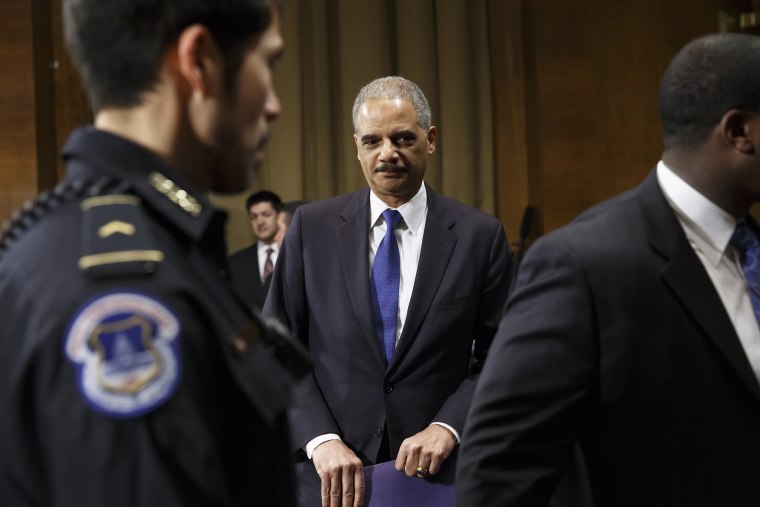U.S. Attorney General Eric Holder placed blame on lawmakers Wednesday when asked about the slow pace of transferring detainees out of the prison at Guantanamo Bay.
“I will say, with all due respect, congressional restrictions that were placed on us thwarted our attempts to close Guantanamo in a more timely fashion,” Holder said in response to a question from Sen. Richard Durbin, an Illinois Democrat. The attorney general was testifying at a Senate Judiciary Committee hearing on oversight of the Justice Department.
More than 150 inmates remain at the prison, and congressional Republicans, opposed to the closure of the facility, have thrown up roadblocks to the effort since shortly after President Obama took office.
At the hearing, Holder touched on several issues he addressed in a recent wide-ranging interview with MSNBC’s Ari Melber, including marijuana, voting rights, the National Security Agency’s metadata program and the United States’ bloated prison system.
On marijuana: Sen. Jeff Sessions, an Alabama Republican, asked Holder about Obama's recent comments that smoking marijuana is "a bad habit and a vice, not very different from the cigarettes that I smoked as a young person ... I don't think it is more dangerous than alcohol."
Holder said that use by young people "of any drug is potentially harmful, including alcohol." Asked if making it legal for adults would allow minors greater access, Holder said, "I'm not sure that's necessarily true."
Holder added that the Justice Department's new rules make prosecuting cases a priority when marijuana is diverted to young people.
On the NSA’s metadata program: “The NSA has acted in a way that’s consistent with the law,” Holder said in response to a question from Utah Republican Sen. Orrin Hatch, though he added that that doesn't mean the program was advisable as policy.
On the U.S. prison system: Holder said that the bloated U.S. prison system is getting in the way of other Justice Department priorities, and he pledged to work with lawmakers to address what he called a "growing and potentially very dangerous problem."
On the proposed legislative fix to the Voting Rights Act: In his prepared testimony, Holder said the DOJ is talking to lawmakers about the bipartisan legislation to fix the Voting Rights Act, which was introduced earlier this month.
"We are vigorously enforcing federal voting protections—and working with Congressional leaders from both parties to refine and strengthen the proposals this body is currently considering—to help ensure that every eligible American has access to the franchise," Holder said.
The Justice Department has filed suit against both Texas' strict voter ID law and North Carolina's sweeping and restrictive voting law, alleging that both measures discriminate against racial minorities.
Pete Williams contributed reporting.
